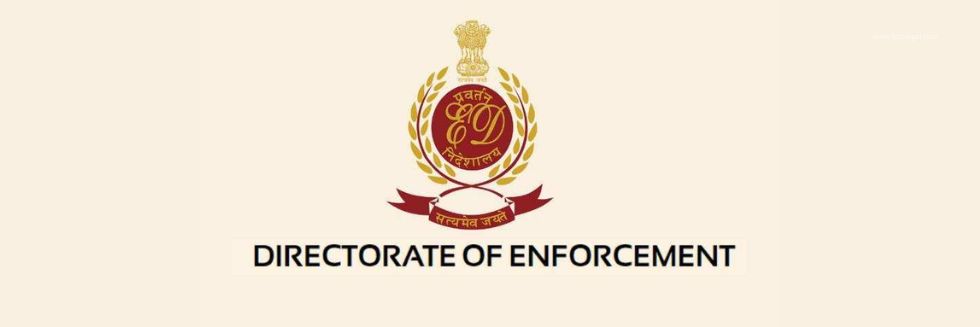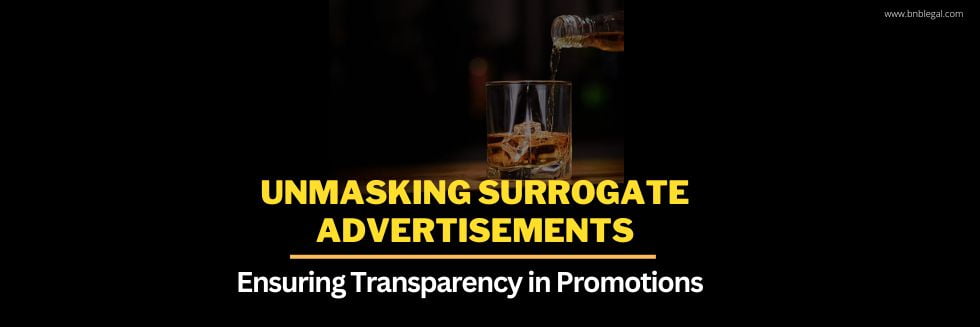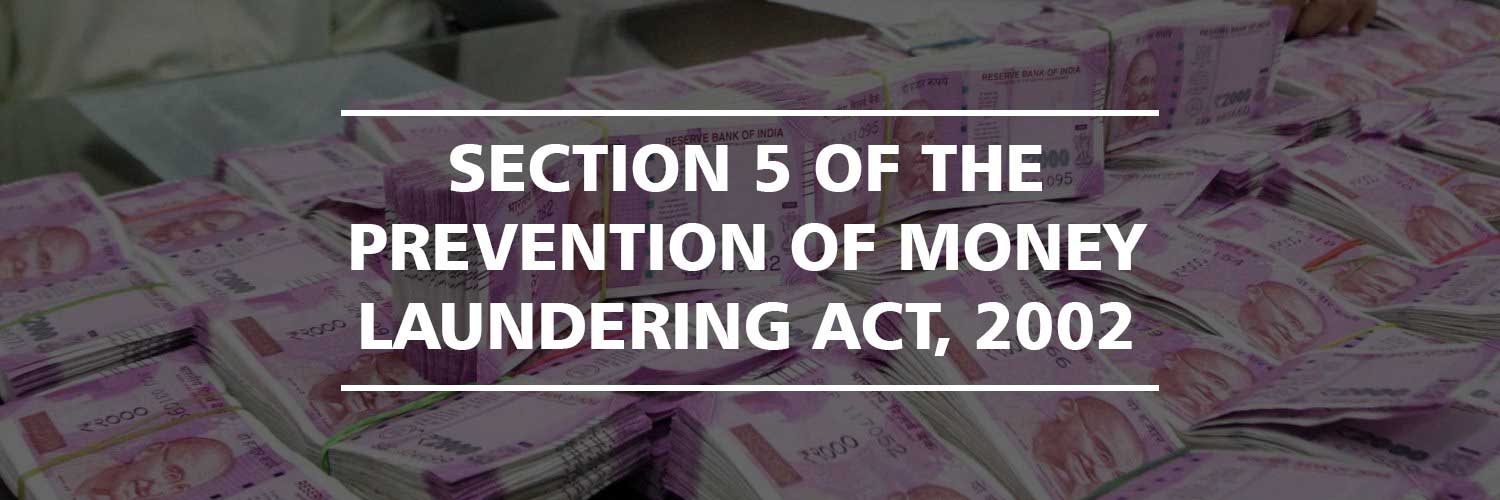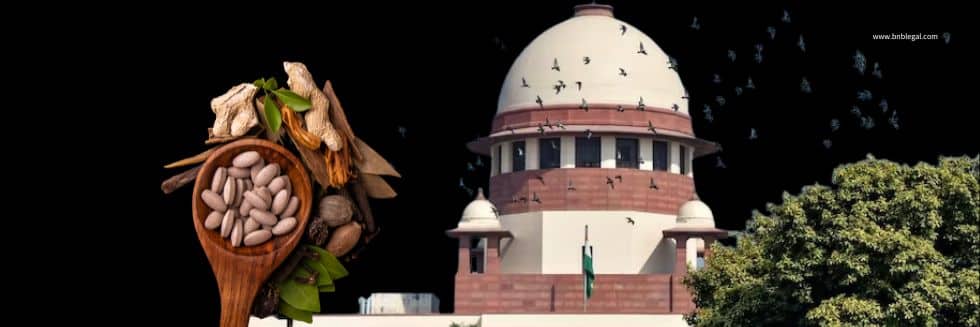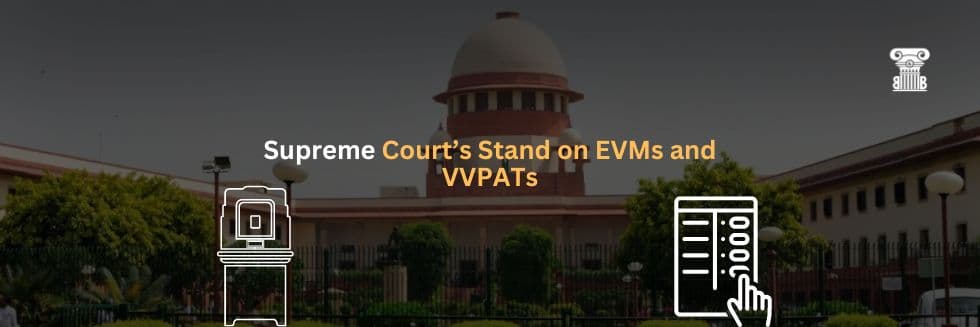We all agree that everyone should get a chance to correct their mistakes. The same is the thought while granting parole to the offenders who are serving their sentence in the prison. Parole is a significant part of the criminal justice system. It refers to the temporary or permanent release of a prisoner before the end of his/her sentence in view of good behaviour. So, what are the parole laws in India, what are the rules to get parole in India, is parole system good for society, and is parole really a tool for social rehabilitation or another opportunity to reoffend.
In this article, we’ll try to find out answers to all your questions in every context.
What Is The Meaning Of Parole And What Are The Parole Laws In India?
Parole word is derived from the French phrase “je donne ma parole” which means “I give my word“. And as per the dictionary meaning, parole means “word of honour”. It is a conditional release of an offender who has served some portion of his sentence in the prison. The concerned authorities allow parole to the offender who remains in custody and under the supervision of the paroling authority.
Parole is a legal measure aimed at correction, reformation and rehabilitation while maintaining social security at the same time.
History And Evolution Of Parole Laws In India
A Scottish geographer and captain in the royal navy, Alexander Maconochie was the first to introduce the concept of parole in 1840. He was the Superintendent of British penal colonies. His motive was to punish the prisoners for their crimes and train them for the future instead of just necessitating the offenders to serve their full sentences.
To make his plans work, he developed a three-grade system. The first and second grades included promotions earned through good behavior, study and labor. On the other hand, third grade included ways to obtain conditional liberty outside the prison while obeying rules. In case, the prisoner failed to obey the rules during that release, the prisoner would return back to prison and have to start the three-grade process all over again.
This ticket to leave system was reformed which led to the formation of the parole system, also considered the world’s first parole system. After that, the prisoners serving intermediate/open-ended sentences were released in case of good behaviour. The ideology behind this system was that a sentence should not be a mere arbitrary sentence but a source for reformation and the greed to return back to society.
Francis Lieber expressed his thoughts in Hague Convention, Declaration of Brussels of 1874 and the Geneva Convention related to the treatment of prisoners of war. A Boston penal reformer, Samvel G. Howe was the one to use the term “parole” for the first time in a correctional context in 1847.
Types Of Parole in India
Mainly, there are two types of parole in India — Emergency parole and Regular parole.
Emergency Parole or Custody Parole
As the name suggests, custody parole is granted in emergency situations. All prisoners, except foreigners and those who are serving death sentences, are eligible to get emergency parole for 14 days in case of death of a family member (which includes grandparents, father, mother, spouse, son, daughter, brother, sister) and marriage of a family member (which includes son, daughter, brother, sister), provided that emergency parole cannot be extended.
The Superintendent of Police is the one to grant parole in the event of the death of a parent’s grandfather, grandmother, father, mother, spouse, son, daughter, brother, or sister, whereas concerned Dy. I.G. in case of marriage of a son/daughter/brother/sister.
Superintendent of jail grants the parole which is subjected to verification of the circumstances by a concerned police station. The decision to grant parole depends on the behaviour of the prisoner while serving the sentence. It also determines whether the prisoner will get parole under police escort or will have to report to the police station daily. Before the release, the offender is responsible for the costs of a police escort.
A prisoner will not be released on regular or emergency parole until a duration of one year following the expiration of his last emergency or regular parole except in the case of the death of the nearest relative.
Regular Parole
With some exceptions, prisoners who have served at least one year of their sentence are eligible to apply for regular parole of one month. The reasons or grounds on which regular parole can be granted include
- A family member’s (which includes father, mother, spouse, son, daughter) serious illness
- A family member’s death or an accident. (same as custody parole, as stated above)
- A member of the family marries.
- The convict’s wife gives birth to the child (except for high-security risk prisoners).
- Maintain social or familial ties.
- Natural calamities cause serious harm to the convict’s family’s life or possessions.
- Continue to file a Special Leave Petition.
What Is The Difference Between Parole And Furlough?
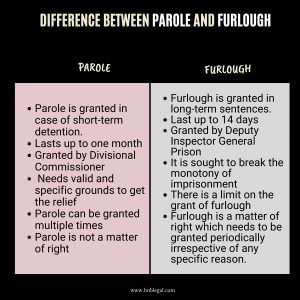
It can be denied even when the prisoner has mentioned a specific ground when the concerned authority is satisfied that releasing the convict would not be in the interest of society. Most often, parole is not granted to convicts sentenced to death, or to those who, in the opinion of jail authorities, are likely to flee when released from prison.
Purposes/Objectives Of Parole In India
The major objective of this legal provision is re-socialisation and assimilation. It aims at the betterment of prisoners. As per Rule 1(A) and 19 of the Prisons (Furlough and Parole) Rules,1959, the objectives of parole include
(a) To enable the inmate to maintain continuity with his family life and deal with family matters,
(b) To save him from evil effects of continuous prison life,
(c) To enable him to maintain and develop his self-confidence,
(d) To enable him to develop constructive hope and active interest in life.
And as per the Budhi v. State of Rajasthan observations, parole serves three purposes which include
- As a motivator for prison inmates to change their ways.
- Ensure that the prisoners’ family relationships are as intact as possible, as they may be prone to fracture as a result of the prisoner’s protracted confinement.
- Assist the offenders in gradually assimilating into society and adapting to its folds.
In the landmark case of Charanjit Lal vs. State of Delhi 28 (1985), it was stated,
- Deterrence, prevention, retribution, and reformation are the four basic goals that a state hopes to achieve by punishing an offender.
- Life offenders should be considered for periodic release from prison, and opportunities should be provided for them to not only handle their personal and family problems but also to retain their ties to society.
- They must be allowed to breathe fresh air for at least a short period of time, provided that they maintain good behaviour throughout their confinement and show a want to mend and become good citizens.
- While they are serving a sentence in jail, the redemption and rehabilitation of such inmates for the good of society must be given fair consideration.
Conditions To Become Eligible To Get Parole
Though the process and rules to get parole in different states are different from one another, here are a few conditions as per the 2010 Parole/Furlough Guidelines which need to be fulfilled to get parole in India.
- A convict must have served at least one year in jail, excluding any time spent in remission.
- The prisoner’s behaviour had to be uniformly good.
- The criminal should not have committed any crimes during the period of parole if it was granted previously.
- The convict should not have broken any of the terms and restrictions of his or her previous release.
- A minimum of six months should have passed since the previous parole was terminated.
What Are The Pros And Cons Of Parole System In India?
Every coin has two sides. Likewise, every process has benefits as well as some drawbacks. As discussed, the parole system aims at rehabilitation of the offenders. It is there with a thought to motivate the prisoners to improve their behaviour. Many who oppose it might want to know about the benefits that this system provides after coming across several incidents of misuse of parole system. So, let’s read about both, the advantages as well as disadvantages of the parole system.
Advantages Of Parole System
- Parole helps in decongesting jails. With the help of the parole system, overcrowding in jails can be avoided.
- It helps in reducing taxpayer expenses. As per the authorities, the cost of parole is presumed to be low in comparison to the cost of incarceration.
- As per some reports, incarceration costs 10 times more than supervising prisoners on parole.
- This is a reward for the prisoners who shows good behavior. It motivates the offenders to rehabilitate.
- It helps the prisoners to stay in touch with their families and community.
- Parole which aims at rehabilitation and reformation provides a short period of relief from the ill effects of being in prison on the mental health of prisoners.
Disadvantages Of Parole System
- The prisoner’s good conduct in prison cannot guarantee good behaviour after release.
- The biggest concern attached to this system is that it allows the prisoners to commit the crime again. There is always a risk that the released person will become a repeat offender. In Saibanna v State of Karnataka, a man who was in prison for killing his first wife killed his second wife and child while on parole.
- Finding work can be difficult while on parole as no one would like to hire a criminal. To get rid of loneliness, homelessness or unemployment, the convicts will start committing the crime again.
- Misuse of parole is also one of the major disadvantages of the parole system. Many have criticized the same in some cases including the most recent one of Gurmeet Ram Rahim.
Cases Related To Misuse of Parole
If there are several examples of cases where this system has actually impacted the prisoners positively, there are cases that clearly show how parole system is misused by privileged. Here are some of the cases of misuse of parole.
Jessica Lal Murder Case
In the famous Jessica Lal murder case, the Delhi government granted parole to Siddharth Vashist alias Manu Sharma despite substantial protests by Delhi police. He had applied for three months’ parole to perform the last rites of his grandmother, take care of his sickly mother and also cater to the family’s business interests.
In its report, the Delhi police had submitted that there was no prompt explanation behind his seeking parole on the ground of his grandmother’s death who had passed in April. The report also stated that his mother is not experiencing any genuine infirmity and his absence is not influencing his business interests in any way.
He was accused of violating parole conditions during his release in 2009 for two months. He was released for one month which was extended for one more month. He was released to attend to his ailing mother in Chandigarh. Shockingly, his mother was addressing a press conference in Delhi and he was spotted in a nightclub in Delhi. As per the parole conditions, he was supposed to be in Chandigarh.
Manu Sharma, son of former Union Minister Venod Sharma was convicted of killing Jessica Lal in 1999. He was acquitted by a trial court. However, Delhi High Court had found him guilty of the murder in December 2006 and sentenced him to life imprisonment. Supreme Court upheld his conviction in April 2010.
He was moved to open prison in 2018 where he was allowed to work with an NGO outside the jail premises in view of his good conduct. Open prison inmates are allowed to step out of prison and work every day. But they can only spend time at the place of work as mentioned in the order and cannot leave the city or go anywhere.
Bibi Jagir Kaur Case
Bibi Jahangir Kaur was sentenced to five years in prison for her role in the murder of her daughter
Manu shot Jessica dead when she refused to serve him liquor at the Tamarind Court restaurant owned by socialite Bina Ramani at Qutub Colonnade in south Delhi’s Mehrauli. Only after four months in prison, she was granted parole. She allegedly received preferential treatment because she was a former cabinet minister of Punjab. She was the first lady to be chosen for the second time as the leader of the Shiromani Gurdwara Prabandhak Committee.
Gurmeet Ram Rahim Case
The most recent case of misuse of parole is of Dera Sachha Sauda Chief Gurmeet Ram Rahim. He was released from Sunaria jail in Rohtak on 40-day parole on October 15, 2022. Prior to that, he was on parole for one month in June 2022 and three weeks’ furlough in February 2022. He was seen hosting satsangs which were attended by many government officials.
Delhi Commission for Women chairperson Swati Maliwal wrote a letter to Prime Minister Narendra Modi seeking changes in remission and parole rules in connection to the Gurmeet Ram Rahim case. She asked the government to develop laws and rules for the release of rapists and the conditions that need to be put before even considering such moves.
Swati wrote, “It has been observed that the convict has been released multiple times during his incarceration. This time, when out on parole, he has held several ‘Pravachan Sabhas and released music videos promoting himself. In fact, recently several senior functionaries of Haryana and Himachal Pradesh Government including the Deputy Speaker and Mayor (Haryana) and Transport Minister (Himachal Pradesh) attended his ‘Pravachan Sabhas’ and pledged their complete allegiance and support to him.”
He has been serving a 20-year jail term after being convicted in 2017 of raping two disciples in his Sirsa ashram. In 2019, he was convicted of the murder of a journalist and in 2021 he was convicted of the murder of a manager of his Dera.
As per the notification of April 11, 2022, related to Haryana Good Conduct Prisoners (Temporary Release) Act, 2022, convicted prisoners can be granted regular parole for 10 weeks in a calendar year in two parts.
What Is The Procedure To Get Parole In India?
As per 2010 Parole/Furlough guidelines, an application for the grant of parole can be sent by the convict himself or on an application made by his relatives/friends/lawyer to the superintendent of jail.
The application for parole includes
- The name of the applicant
- Name of the father of the applicant
- Address of the applicant
- In case the application is submitted by a friend/relative/lawyer, the details of the relationship with the convict
- Family details are known of the convict known to the applicant
- Last confirmed address of the convict
- Reasons for seeking parole
In the process of steps to get parole, the Superintendent of jail must record the application in the parole register and verify the details in a face-to-face interview. Then, the report will have to be shared with the divisional police station to conduct a fair inquiry. In case of a medical emergency, the medical reports are verified to prove the authenticity of the application. After the completion of preliminary verification, the application is then sent to competent authorities to sanction the release. In some states, the application is sent to the Inspector General of the Prison and then to the District Magistrate who along with the consultation of the State Government decided on whether to accept the application or not.
Does Parole Come Under Sentence?
Parole is a temporary termination of the sentence with the sentence’s quantum remaining unchanged. The Supreme Court has different views in different cases when comes to deciding whether parole will cover the sentence time period too or not.
In the case of Smt. Poonam Lata v M.L. Wadhawan (1987), Supreme Court noted that “it must thus be decided that the duration of release has to be disregarded in computing the period of confinement.
However, in the case of Sunil Fulchand Shah v. Union of India (2000), the Supreme Court said that a temporary release of the person detained does not change his status because his freedom and liberty have not been entirely restored. As a result, temporary release on parole cannot be deducted from the maximum imprisonment period, the apex court added.
Bombay High Court through the Divisional Commissioner concluded that parole is a limited legal right afforded to a criminal in the instances of Kantilal Nandlal Jaiswal v. Divisional Commissioner, Nagpur (2019) and Hariom Vijay Pande v. State of Maharashtra (2019).
However, the Supreme Court in Home Secretary (Prison) v. H. Nilofer Nisha (2020) stated unequivocally that the issuance of remission or release is not a right conferred on the prisoner. It’s a privilege that the prisoner can get if he or she meets specific requirements.
In What Circumstances Parole Can Be Denied To A Prisoner?
Parole is a part of the correctional process where the offender is given a chance to change criminal behaviour and become a useful member of society. Different states have different rules related to parole based on administrative directives.
- Convicts whose release on parole is considered dangerous or a threat to national security or there exists any other reasonable ground such as a pending investigation in a case involving serious crime;
- Prisoners who have been involved in crimes and offences against the State, like sedition or who have been found to be instigating serious violation of prison discipline;
iii) Prisoners who have escaped from jail;
iv)The prisoner is not a citizen of India.
In the following cases, parole would ordinarily be not granted except, if in the discretion of the competent authority special circumstances exist for the grant of parole;
- If the prisoner is convicted of murder after rape;
- If the prisoner is convicted for murder and rape of children;
- If prisoner is convicted for multiple murders.
In Kesar Singh Guleria vs State of Himachal Pradesh (1984),
“Another important factor required to be borne in mind by the Releasing Authority is that the rules of procedure governing the temporary release on parole or furlough are intended to subserve and not to subrogate the substantive provisions. The various rules prescribing the procedure for temporary release must be viewed and implemented bearing in mind this salient principle. Though the forms of application (Form A-l and Form A-2) are prescribed, still no application which substantially complies with the requirement of the relevant form should be rejected, even if it does not strictly conform to the prescribed form. Besides, the District Magistrate, who is under a statutory duty to give an opinion whether the temporary release of a prisoner on parole or furlough is opposed on grounds of the prisoner’s presence being dangerous to the security of the State or prejudicial to the maintenance of public order, must bear in mind the clear distinction between the concepts of “security of the State”, “public order” and “law and order”. “Security of the State” would involve breaches of public tranquillity leading to national upheavals, such as revolution, civil strife, war, etc. and cover any activity affecting the security of the State. The distinction between the concepts of “public order” and “law and order” has since been explained in Lall Chand’s case (1985 Cri LJ NOC (Him Pra) 46) (supra). “Public Order”, if disturbed, must lead to public disorder. A mere disturbance of law and order leading to disorder is not the same as a disturbance which subverts public order. An apprehended breach of peace or the possibility of the prisoner committing a crime during the parole period, without anything more, would constitute a law and order problem and not a problem touching public order. It would thus appear that “public order” comprehends disorders of lesser gravity than those affecting “security of the State” and that “law and order” comprehends disorders of lesser gravity than those affecting “public order”. In cases involving problems of law and order, the proper course to be adopted is not to give an opinion that the request for release be rejected but to advise that the release be ordered subject to appropriate conditions, such as, that surveillance be kept over the prisoner during the period of his temporary release and that he be asked to report to the nearest police station at appropriate intervals. Indeed, in an appropriate case, the power conferred by R. 4 can be recommended to be exercised if an occasion, therefore, arises, having regard to the conduct of the prisoner who is temporarily released.”
Penalty For Misuse Of Parole
In the case of Section 224 of the Indian Penal Code, 1860, an offender who overstays parole or does not return to prison within the stipulated time is liable for imprisonment which may extend up to 2 years/fine and/or both. As per 2010 guidelines, all remissions will be forfeited in case of misuse.
Ministry Of Home Affairs’ 2020 Parole Guidelines
The Ministry of Home Affairs has issued guidelines related to parole in which it has advised the States to evolve and implement suitable behavioural therapy and counseling programs for inmates by involving Psychologists and other experts to bring in the desired behavioural changes. MHA further asked the States to review the existing guidelines to ensure that the facility and concession given to inmates, by way of parole, furlough and premature release etc., with the intention of providing them relief and rehabilitation, is not abused and misused by them and their advantage does not turn into disadvantage and nuisance for the society at large. The following provisions were suggested to be included in the guidelines related to parole, furlough, remission, and probation.
i) Grant of parole and furlough to those offenders, whose release may have an adverse impact on the security of the State or safety of individuals, may be strictly restricted.
ii) The parole rules of States, including the criteria, duration and frequency may be reviewed after making an assessment based on their experience about the benefits and detriments of such parole.
iii) Parole and furlough may not be granted as a matter of routine and may be decided by a Committee of officers and behavioural experts, who may meet as per requirement, keeping in view all relevant factors, especially for inmates sentenced for sexual offences, serious crimes such as murder, child abduction, violence etc.
iv) It may be useful to invariably include an expert Psychologist/Criminologist/ Correctional Administration Expert as a member of the Sentence Review Board and in the Committee which decides grant of parole and furlough to inmates and obtain their opinion before such temporary release.
Is Parole A Right?
“Model Prison Manual, 2016 provides that the privilege of release on parole and furlough should be allowed to selective prisoners on the basis of well-defined norms of eligibility and propriety. Release on parole is not an absolute right. It is a concession,” stated MHA’s 2020 guidelines.
Parole is not recognized as an absolute right but it has administrative importance. The prisoner authorities have the discretion to grant parole to the prisoner in consultation with the State government. The European Court of Human Rights, who has extensive jurisprudence related to parole, considers an irreducible life sentence against human dignity. According to African Commission on Human and People’s Rights, the States should alter their laws to allow for parole.
In the Ashfaq v. State of Rajasthan (2017), Supreme Court noted,
“A parole can be defined as conditional release of prisoners i.e. an early release of a prisoner, conditional on good behaviour and regular reporting to the authorities for a set period of time. n that eventuality, it is to be treated as mere suspension of the sentence for time being, keeping the quantum of sentence intact. Release on parole is designed to afford some relief to the prisoners in certain specified exigencies.”
In Asha Ram v State of Rajasthan (2012), the Jodhpur bench of Rajasthan High Court scrutinized the Superintendent of Police’s report and determined that it was ambiguous and uncertain. “It is well understood that the goal of parole is to make the necessary steps to rehabilitate a convict-prisoner in the mainstream of society. The authorities must ensure the maintenance of law and order and the avoidance of a breach of peace, but the petitioner cannot be denied parole where he is otherwise eligible and entitled,” it stated.
Gujarat High Court in Natia Jiria v. State of Gujarat (1984) observed, “Though no prisoner has a legal right to furlough the rules are applicable to all prisoners alike and therefore when furlough is granted to one prisoner it cannot be denied to another prisoner. To do otherwise would be an arbitrary conferment of favour on some while denying it to the others.”
In Mohd. Sabir v. State of Punjab and Ors. (2021), Punjab and Haryana High Court noted that parole is a privilege granted by the State to prisoners, but however, it cannot be clipped for vague reasons. The court added that it cannot be revoked for arbitrary grounds.
Conclusion
We hope that this article answers all your questions related to parole. This is everything you need to know about parole laws in India. The parole rules differ from State to State as every State has its own set of guidelines for parole, furlough, remission of sentence and probation.
This article is written by Varsha. You can reach out to the author via email at bnbvarsha@gmail.com.

